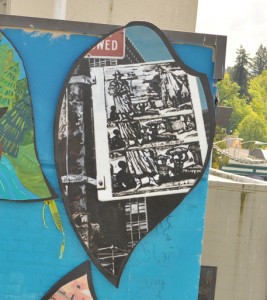Repo History, USA
- REPOhistory began in Manhattan in 1989 as a study group of artists, scholars, teachers, and writers focused on the relationship of history to contemporary society. It grew into a forum for developing public art projects based on history and a platform for creating them. For the past ten years REPOhistory’s goal has been “To retrieve and relocate absent historical narratives at specific locations in the New York City area through counter-monuments, actions, and events”. The work is informed by a multicultural re-reading of history which focuses on issues of race, gender, class and sexuality. We choose to create public art because we wanted to expand the audience for art by going outside the confines of the museum and gallery structure. By choosing to create work with strong, alternative social commentary we are drawing on a tradition in art that is often ignored; the legacy of the Berlin Dadaists, Russian Constructivists, the New York Photo League and contemporary organizations like Political Art Documentation/Distribution (PAD/D), Group Material and Grand Fury.Through 6 major public projects and many smaller events, REPOhistory has continued to pursue this goal as an artist/scholar cooperative, along the way adding to its goals “to raise questions about the construction of history, to provide multiple viewpoints that encourage viewers to think critically, to explore how histories and their interpretations affect us today, and to engage with specific communities in order to facilitate their efforts to construct their own public histories”.
We believe that the arts are important to all aspects of society. The relationship between art, culture and society is often confused, vague and ambiguous. In the USA it has sparked the “Cultural Wars” of the 1980s and the early 1990s. Even today there are many members of the US Congress and Senate who want to abolish the National Endowment for the Art and the National Endowment for the Humanities. The arts will always be controversial. Societies change and the arts can be a powerful way of expressing these changes. However, the arts are essential for helping individuals find their place within society and for shaping a collective cultural identity.
